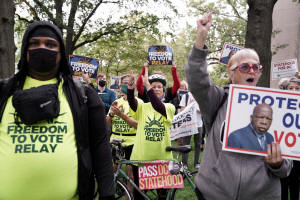Democratic lawmakers say U.S. election workers vulnerable without new
voting-rights law
 Send a link to a friend
Send a link to a friend
 [January 12, 2022]
By Joseph Tanfani and Moira Warburton [January 12, 2022]
By Joseph Tanfani and Moira Warburton
WASHINGTON (Reuters) - U.S. election
workers could face escalating threats, potentially imperiling American
democracy, if major voting-rights legislation backed by President Joe
Biden fails to pass the Senate, Democratic lawmakers and rights
advocates warned.
Democrats have teed up a pair of bills that would make it a crime to
threaten or intimidate election workers, among other provisions that
would expand voting access, toughen campaign finance rules and prevent
partisan gerrymandering. The bills address a surge in threats
documented by a September Reuters investigation .
Democrats say passage of the bills is critical to protect elections
after Republican-led states adopted a wave of new restrictions on ballot
access following Donald Trump's false claims that widespread fraud cost
him re-election in 2020.
But it will be difficult to pass the bills amid united Republican
opposition in the narrowly divided Senate, where Democrats disagree on
whether to amend the "filibuster" rule that requires 60 of the 100
senators to pass most legislation.
On Tuesday, Biden called for Senate Democrats to do whatever it takes to
pass the bills, including amending the filibuster. Sponsors of the bills
say inaction will result in intimidated election officials and
increasing threats to rank-and-file workers, making it harder to run
fair elections.

"If you don't have independent election workers that are about the
integrity of the process then I don't know how our elections can
proceed," Democratic Senator Mark Warner said in an interview, warning
that more harassment would make it difficult to hire staff for future
elections.
"If these people won't perform this function, and you suddenly have only
partisans in these roles then people's faith again in our system is
going to be undermined."
Democratic Representative Colin Allred, who has sponsored bills to
safeguard election workers, said they need the tough new protections,
which also would make it tougher for political leaders to fire
professional election administrators.
[to top of second column]
|

Voting rights activists rally at the Robert A. Taft Memorial and
Carillon following a three-day, 70-mile “Freedom to Vote Relay” from
West Virginia, in Washington, U.S., October 23, 2021. REUTERS/Shuran
Huang/File Photo
 "If Donald Trump is the candidate
for the Republican Party in 2024, ... every county is going to
become a battleground," Allred said in an interview.
The former president has not said he will run again in 2024, but has
publicly flirted with the idea and his endorsements are shaping the
field of Republicans trying to regain control of U.S. Congress in
the Nov. 8 midterm elections.
Senate Republicans dismiss the voting-right bills as unnecessary,
saying that the record-shattering turnout in the 2020 election shows
the strength of American democracy.
"These states have changed their laws in a way that makes it easier
to vote than it was in any other election than the pandemic
election," of 2020 Republican Senator Roy Blunt told a news
conference.
The Senate's top Democrat, Chuck Schumer, has pushed for a floor
vote on the voting rights bills by the Monday holiday honoring slain
civil-rights hero Rev. Martin Luther King Jr. But Democrats cannot
end the filibuster rule without all 50 of their senators, and two of
them, Joe Manchin and Kyrsten Sinema, have adamantly opposed the
step. They have said it would damage the Senate and could lead to
constant change in major aspects of American life each time power
changes hands in Washington.
A handful of moderate Senate Republicans have voiced support for a
more limited voting rights bill, though they have said they don't
see the urgency almost three years ahead of the next presidential
election.
Warner said that if the larger rights bills fail, Democrats could
try again to pass a more limited bill focused on protecting election
workers from threats.
(Reporting by Joseph Tanfani and Moira Warburton; Editing by Scott
Malone and David Gregorio)
[© 2022 Thomson Reuters. All rights
reserved.] This material may not be published,
broadcast, rewritten or redistributed.
Thompson Reuters is solely responsible for this content. |